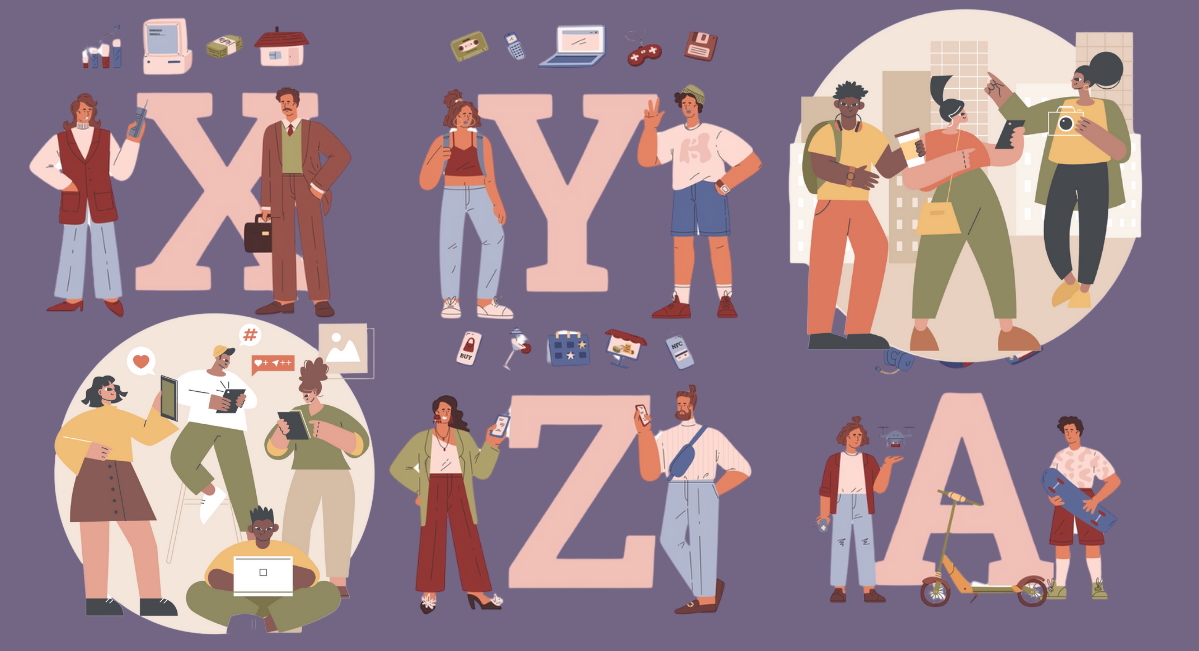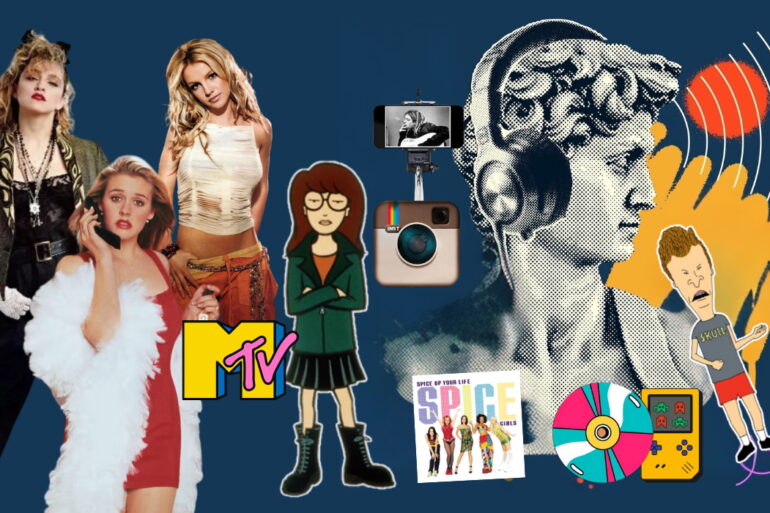Let’s settle, once and for all, which generation is really the best. So, hold on to every combative insult you’re sitting on right now.
At some point in all of our lives, we’ve been on the receiving end of a “young people ruin everything” remark from someone older.
Baby Boomers and Gen X scoffed at Millennials for never truly understanding the meaning of “hard work” (we’re dreamers, after all). Gen Z is tired of hearing about how great the ’90s were. And, in many ways, Millennials will both hate and love how teenagers can so easily abandon the notion of working a 9-to-5 job and become influencers overnight.
From coffee-infused morning raves to running clubs turned dating sites, I look away as my younger cousin—early twenties, Gen Z—stares me into oblivion for writing this lead paragraph, while my Gen Alpha niece is on TikTok singing KPop Demon Hunters’ Golden for the nth time.
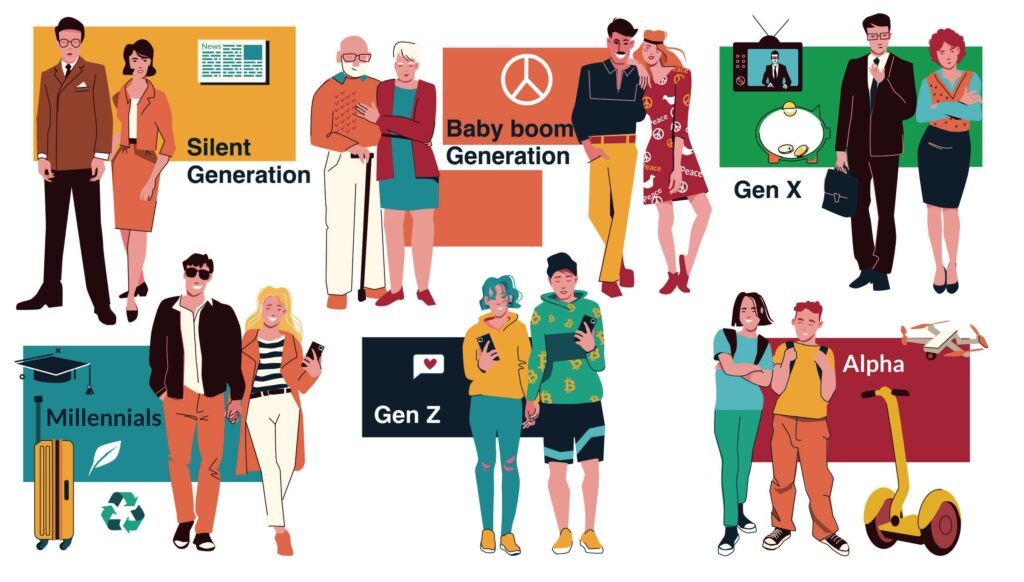


Let’s settle once and for all which generation is the best. So, hold on to every combative insult you’re sitting on right now. Odds are, most of what you’re thinking has already been uttered—maybe even chiseled by an older generation convinced the next one will bring their ruin.
Generation-bashing is as old as time itself.
One of the most recent examples came in 2019, when the term “OK, Boomer,” entered the parlance largely in part by a Generation Z (born from 1997-2012) who uploaded a video on TikTok using the now common phrase as a catch-all slang retort to out of touch people usually any person over 30 expressing an opinion or condescension towards younger people.
There’s a natural tendency to remember the easiest and most positive memories from one’s generation while subconsciously leaving out the rest. It creates an imbalance—an impartial mentality—that can be weaponized against one another.
Viral doesn’t even begin to describe these two words that resonated across generations, industries, and the very fabrics of socio-economic systems that were largely run by the Baby Boomers themselves (born between 1946 and 1964).
While it can be argued that there’s no sense arguing with an internet meme, Bob Lonsberry, an American conservative radio host, author, and former journalist did just that. He even went as far as calling it as the new ‘n-word’ of ageism or an act of prejudice and discrimination against older people because of negative stereotypes.
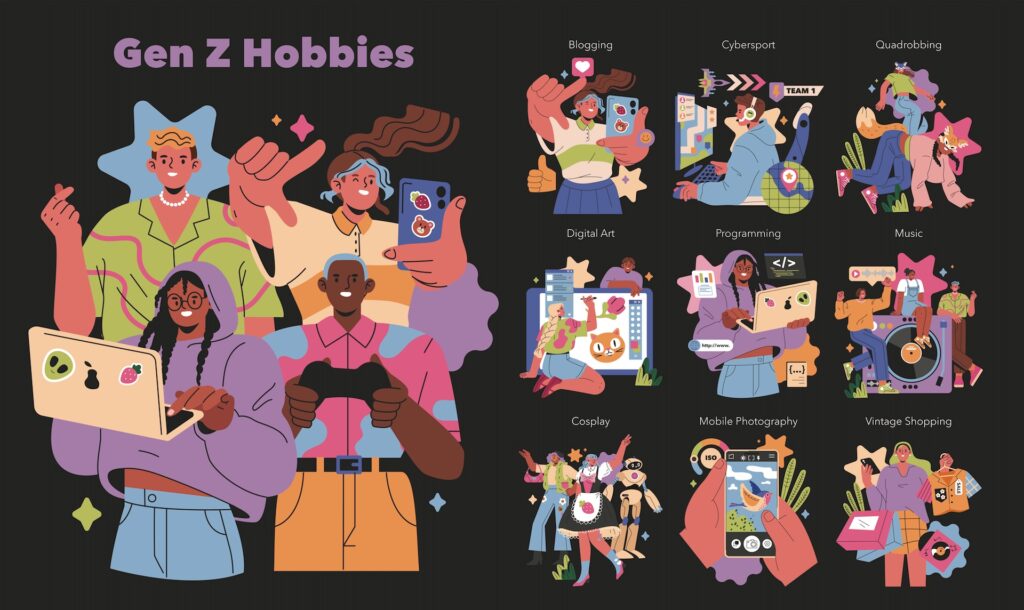


It received a subtler treatment here in the Philippines. For one thing, columnist Hyacinth Tagupa saw the backlash from the sentiment as a catalyst for discourse. In her book OK Boomer, Tell Me Y: When Two Generations Talk (2021), she calls for conversation, not a generation war. A Millennial herself, she argues that instead of asserting which generation is better, it’s wiser to engage in civil dialogue—disproving stereotypes and fostering a deeper understanding of one another.
Related story: Generation Beta begins in 2025. How will these babies born from 2025 to 2039 mark their era?
Related story: Did millennials follow their dreams after all?
Related story: 10 fun facts about Gen Z and millennial travelers in Asia Pacific
Historical haters
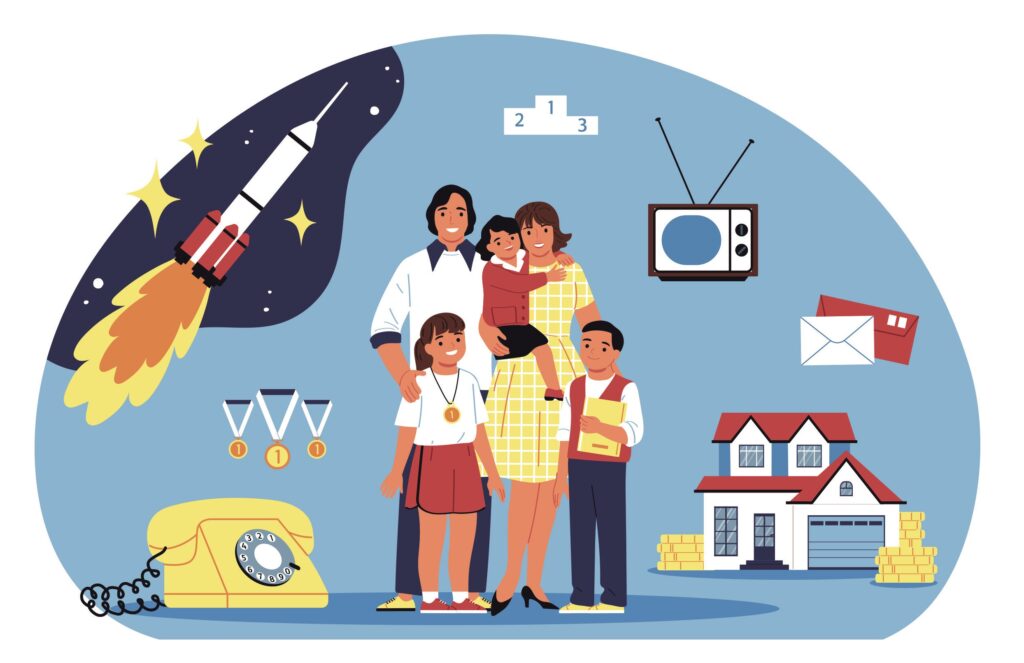


If anything delayed me in finishing this article, it was sifting through the treasure trove of generational haters throughout history—insults hurled from the depths of civilization, starting with Greek philosophers to Gen Zs and Alphas yeeting their way out of conversations while calling everyone they know “bro.”
Aristotle, founder of the Lyceum—which laid the foundations for systemic learning and formal education—had this to say about youth in his treatise Rhetoric: “Young people are high-minded because they have not yet been humbled by life, nor have they experienced the force of circumstances…They think they know everything, and are always quite sure about it.”
I don’t think there’s a single easy solution to stop generations hating one another. But if I had to name one, it would be historical perspective—perspective guided by empathy to understand the context of the past, and perspective to recognize the rapid advances and demands of modern life.
True to the Romans’ high regard for many Greek ideologies and culture, Horace—a well-known lyric poet from the first century BCE—personally attacked me with this thought: “The beardless youth… does not foresee what is useful, squandering his money.”
I may not have the riches of a Roman elite, but dagnabbit, I can grow a beard! I feel like I got angry for an entirely different reason. No wonder Latin is dead, but I digress.
Japanese author and 13th-century CE monk Yoshida Kenkō expressed his disdain for the youth of his time, who, he believed, had diminished the formality of language. In his most reviewed work, Essays in Idleness or Tsurezuregusa(written circa 1330–1332) during Japan’s feudal era, he wrote: “The ordinary spoken language has also steadily coarsened. People used to say ‘raise the carriage shafts’ or ‘trim the lamp wick,’ but people today say ‘raise it’ or ‘trim it.’ When they should say, ‘Let the men of the palace staff stand forth!’ they say, ‘Torches! Let’s have some light!’ Instead of calling the place…‘the Hall of the Imperial Lecture,’ they shorten it to ‘the Lecture Hall,’ a deplorable corruption…”
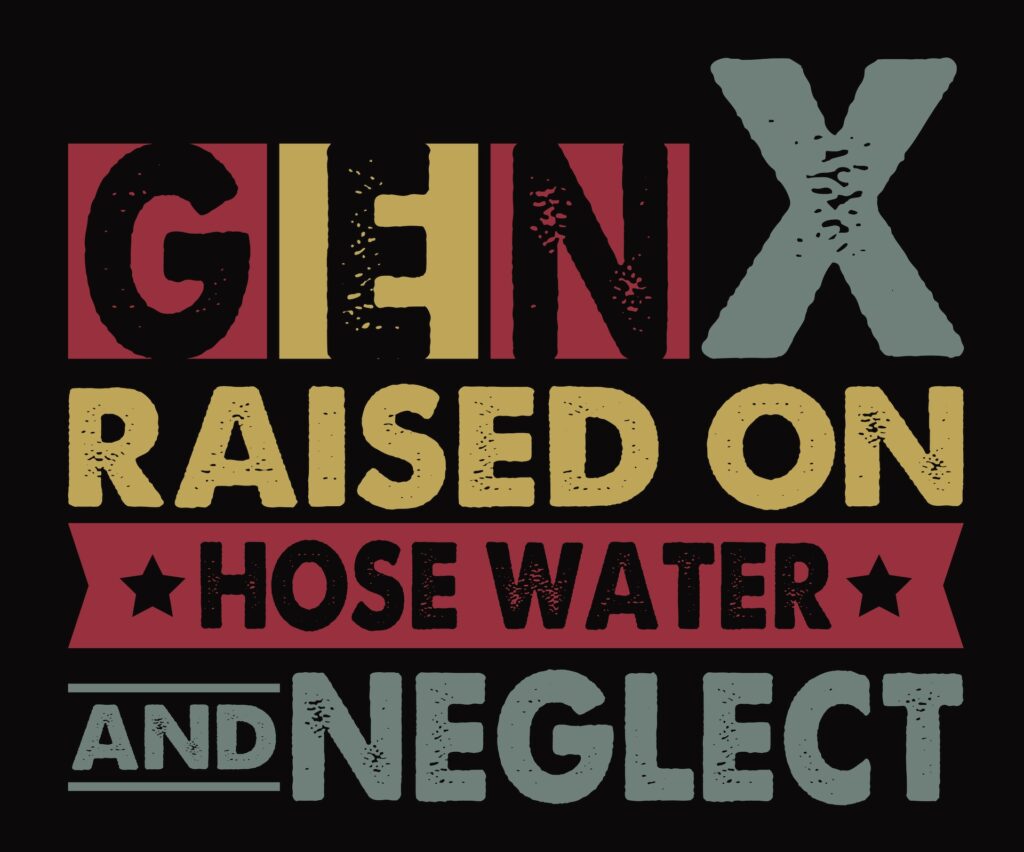


Kenkō-san would be pissed to hear how the youth of today blurt out, “Is he the big sigma, who has a sort of a skibidi toilet energy, no cap for real?” I’m pretty sure I butchered that—and I’m well aware of how adults hated us Millennials prancing around asking “What did the fox say?” way back in 2013.
And my favorite quote, published by Christopher Georges in The Washington Post during my birth year of 1993, reads: “What really distinguishes this generation from those before it is that it’s the first generation in…history to live so well and complain so bitterly about it.”
Okay, doomer—how do we stop the fighting?



That last one feels the most universal. Whenever young people complain about the hardships of their day, someone older will always rebut with “Back in our day [insert generational challenge here],” invalidating what the younger ones are facing.
This could be the root of the generational divide. Human memory is fragile and unreliable. There’s a natural tendency to remember the easiest and most positive memories from one’s generation while subconsciously leaving out the rest. It creates an imbalance—an impartial mentality—that can be weaponized against one another.
Without delving too deep into politics, it’s the same reason many in the older generation recount the Martial Law period in the Philippines as a “golden era.” What do most of them remember? Some of my relatives who lived outside Metro Manila fondly recall afternoons playing in the streets with their neighbors. But this view is marred by a lack of context. Sure, it may have been all fun and games in your town, but elsewhere, people were suffering. Both experiences share the same historical period but reflect vastly different realities—one harkens to the idylls of peaceful provincial life, the other is scarred by the perils of merely speaking one’s mind.
Related story: Millennials and Gen Zs have a new love language—and they’re willing to spend for it
Related story: An open letter to Gen Z from a millennial
Related story: Is running the new Tinder?
Our minds subconsciously latch onto “presentism.” According to the 2004 study “Autobiographical Memory and Self-Assessment” by Jessica J. Cameron, Anne E. Wilson, and Michael Ross, presentism is the tendency to recreate and interpret history based on current ideas and values, rather than from the knowledge and values of the period.
Trivialization of events



For this, I cite my gripe with the younger generation: the trivialization of the September 11 attacks, or 9/11.
I was eight years old at the time, brushing my teeth with my parents as we were about to go to sleep, when breaking news flashed on our television screens. Although thousands of miles away from the terrorist attacks, I felt deeply disturbed seeing a plane crash head-on into the first tower of the World Trade Center in New York City.
Fast-forward to Instagram, Facebook Reels, and internet memes using one of the world’s most notorious tragedies as punchlines for content. It can be argued that the passage of time has desensitized an entire generation to what was once barely whispered, turning it into a subgenre of internet humor steeped in absurdity and satire.
The truth is, the next generation will always feel somewhat disconnected from certain issues and problems the previous generations faced, whether or not those problems have been solved. Everyone may recognize the atrocities, the hardships, and the social climate of the time, but the next generation can never fully share the emotional weight, which inevitably fades with time.
In 2010, academics Peter McGraw and Caleb Warren postulated the “Benign Violation Theory.” They argued that the more distant something is, the less threatening it becomes—and that makes it easier to view as benign, even to the point of making jokes about horrific events in human history.
So, how do we stop this hate? We can’t—not entirely. The most we can do is remain vigilant about contextualizing our thoughts, arguments, and understanding. Many people study history to understand wars. Humanity has waged military campaigns for centuries—over race, culture, religion, economics, social standing, and more.
But never in human history has one group waged war against another simply because they weren’t born in the same era.
As someone born in 1993, I don’t think there’s a single easy solution to stop generations hating one another. But if I had to name one, it would be historical perspective—perspective guided by empathy to understand the context of the past, and perspective to recognize the rapid advances and demands of modern life. Only then can we work toward a shared vision of the world we truly want—a world that everyone, across generations, can be proud of.
Related story: What you must know about how Gen-Z uses emojis
Related story: No second chances: Is the ‘cut them off’ dating trend too harsh or just clear?
Related story: Are Filipino millennials more hopeful about marriage than their Asian counterparts?

